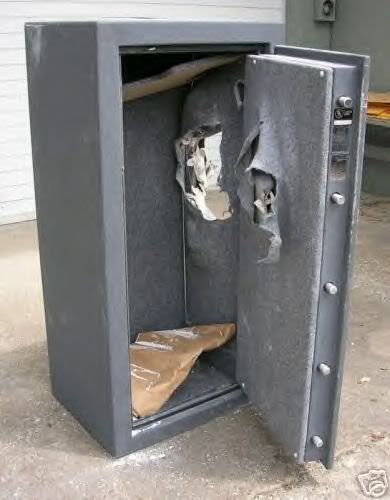As someone pointed out, you cannot trust the manufacturer's own internal test for fire rating. I'd buy one *ONLY* if the test was done by U.L. (underwriter's laboratory).
There's only one problem with this.....I have never, ever, seen a gun safe with a UL fire rating. Gun safe companies tend to use dry insulation, and only moist insulation can handle the higher temps that UL tests.
Also, in some cases a safe may very well pass the UL test, but for various reasons will not carry a tag. UL regulations state that all safes must be produced identical to the safe tested. If you change anything about the design, you have to resubmit for testing.
There are a lot of safe companies that build outstanding custom safes which can not carry UL tags for this reason. A UL rating isn't the end all be all, but it is a good benchmark.
there is a sticker placed on the inside edge of the door that gives it's fire rating. I thought it was a UL sticker
The UL sticker inside of your Liberty safe indicates that it kept a UL tech armed with a hammer and a screwdriver out of the safe for 5 minutes. This is a UL RSC (Residential Security Container) rating. Notice the Lab didn't refer to the unit as a "safe" but rather a "container". This is because most gun safes aren't really considered safes by professionals.
Liberty makes an OK product, but I believe they are one of the worst at deceptive marketing practices.
They always have lots of impressive pictures of their safes which people have tried to get into
Anybody that claims that nobody has ever broken into a safe they made is either a liar, or hasn't been in the safe business very long. Most gun safes are built out of very thin steel....this steel does not take on magical properties just because they form it into a box and mount a dial on it.
I've seen bank vaults compromised. I've seen 1.5" steel plate safes cut in half. I've seen 5,000 pound safes "walk off". A 12 gauge steel gun safe is 1/10" thick. Most gun safes are the wet paper bag of the safe business.
Most people will not encounter a professional burglar, and don't need bank type protection. Unfortunately, even a meth head can swing an axe or a hammer during a smash and grab.
Just weigh your options before making a decision. If you are willing to accept a little higher risk for a cheaper, less secure safe then that's fine....so long as you understand the risk. The problem I have with a lot of these gun safe companies, is that they mislead the consumer into thinking they are getting a far greater protection than they really were.
By the way...here's what 5 minutes with a sledge will do to a 12 gauge safe.

